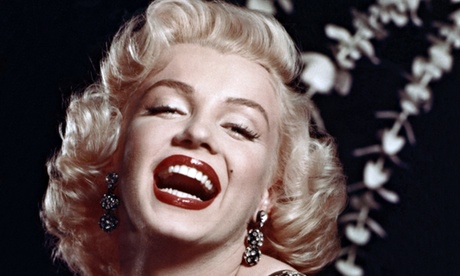It was on this day in 1962 that Marilyn Monroe was reported to have died by the newspapers all over the world. What a great loss.

New York, August 5
Marilyn Monroe was found dead in bed this morning in her home in Hollywood, only a physical mile or two, but a social universe, away from the place where she was born 36 years ago as Norma Jean Baker. She died with a row of medicines and an empty bottle of barbiturates at her elbow.
These stony sentences, which read like the epitaph of a Raymond Chandler victim, will confirm for too many millions of movie fans the usual melodrama of a humble girl, cursed by physical beauty, to be dazed and doomed by the fame that was too much for her. For Americans, the last chapter was written on the weekend that a respectable national picture magazine printed for the delectation of her troubled fans a confessional piece called "Marilyn Monroe pours out her soul."
The plot of her early life is as seedy as anything in the pulp magazines, and to go into the details now would be as tasteless as prying into the clinical file of any other pretty woman whose beauty has crumbled overnight. It is enough, for summoning the necessary compassion, to recall her miserable parents, her being shuttled like a nuisance from foster home to orphanage, the subsequent knockabout years in a war factory, her short independence as a sailor's wife, the unsuspected first rung of the ladder provided by a posing job for a nude calendar.
She talked easily about all this, when people had the gall to ask her, not as someone reconciled to a wretched childhood but as a wide-eyed outsider, an innocent as foreign to the subject under discussion as Chaplin is when he stands off and analyses the appeal of " The Little Man."
Then she wiggled briefly past the lecherous gaze of Louis Calhern in John Huston's " Asphalt Jungle," and his appraising whinny echoed round the globe. Within two years she was the enthroned sexpot of the Western world. She completed the first phase of the American dream by marrying the immortal Joe Di Maggio, the loping hero of the New York Yankees; and the second phase by marrying Arthur Miller and so redeeming his suspect Americanism at the moment it was in question before a House committee.
To say that Marilyn Monroe was a charming, shrewd, and pathetic woman of a tragic integrity will sound as preposterous to the outsider as William Empson's Freudian analysis of Alice in Wonderland. It is nevertheless true. We restrict the word "integrity" to people, either simple or complex, who have a strong sense of righteousness or, if they are public men, of self-righteousness. Yet it surely means no more than what it says: wholeness, being free to be spontaneous, without reck of consistency or moral appearances. It can be true of forlorn and bewildered people as of the disciplined and the solemn.
In this sense, Marilyn Monroe was all of a piece. She was confused, pathologically shy, a straw on the ocean of her compulsions (to pout, to crackwise, to love a stranger, to be six hours late or lock herself in a room). She was a sweet and humorous person increasingly terrified by the huge stereotype of herself she saw plastered all around her. The exploitation of this pneumatic, mocking, liquid-lipped goddess gave the world a simple picture of the Lorelei. She was about as much of a Lorelei as Bridget, the housemaid.
This orphan of the rootless City of the Angels at last could feel no other identity than the one she saw in the mirror: a baffled, honest girl forever haunted by the nightmare of herself, 60 feet tall and naked before a howling mob. She could never learn to acquire the lacquered shell of the prima donna or the armour of sophistication. So in the end she sought the ultimate oblivion, of which her chronic latecomings and desperate retreats to her room were token suicides.
